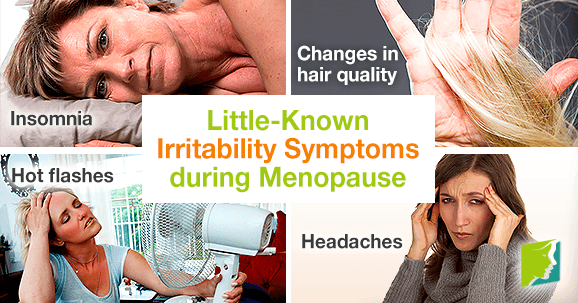A wealth of information exists surrounding the most common symptoms of menopause, such as hot flashes and night sweats, but other secondary side effects and their ramifications are less widely discussed. Irritability, for example, is thought to be relatively self-explanatory; in truth, however, there are several sides to this chronic condition that sufferers should understand as they look for ways to treat it, and some of them may be further exacerbated by the underlying hormonal imbalance. Read on to learn about four irritability symptoms that don't get their full due to understand the disorder at a deeper level.
Insomnia
Chronic irritability symptoms are commonly caused by excess stress, and the combination of the two can sometimes result in sleep deprivation. This, of course, turns into a vicious cycle of unpleasant feelings, as a lack of sleep can subsequently aggravate irritability, even increasing the likelihood of overreactions and lashing out in anger. Deep-breathing techniques, such as those practiced in yoga, are often helpful for overcoming this problem.
Changes in Hair Quality
Along with many other menopausal side effects, irritability symptoms are often the direct result of hormonal imbalance. When this occurs, sufferers may also notice changes to the quality of their skin and hair. Graying and the beginnings of hair loss have both been reported among menopausal women, and are thought to be connected to both mental and oxidative stress, as well as higher levels of testosterone. However, studies on the subject are ongoing.
Hot Flashes
Exaggerated and acute irritability can also intensify more well-known menopausal symptoms, most notably influencing the recurrence of hot flashes, or the sensation of overheating on the head and chest that afflicts the majority of women during this stage of life. Managing irritability symptoms can minimize the amount of episodes experienced of each, which makes for a welcomed return to normal daily life.
Headaches
Irritability symptoms are frequently examples of emotional distress having physical manifestations. Chronic anger and frustration can wear on the body and weaken its defenses, and headaches are sometimes the result. This symptom can present itself during a brief period of continued stress, but also in the 48 hours after it's over. In the latter case, it is known as a “distension” headache, and its origin lies in the normalization of blood vessels in the head after cortisol exposure is over. Drinking enough water can counteract the problem, as proper hydration allows all internal systems to function at optimum levels.
As women's bodies undergo the massive flux of menopausal change, it's vitally important to understand all the symptoms - and the symptoms of those symptoms - in order to find an effective plan for treatment. Talk to a health care professional about seeking relief from chronic irritability and all that surrounds it today, to find lifestyle changes and other techniques that will work.
Sources
- Kahn, A. (2013). Irritability: Causes, Symptoms & Diagnosis. Retrieved October 29, 2013, from http://www.healthline.com/health/irritability
- Trüeb, R.M. (2009). Oxidative Stress in Ageing of Hair. International Journal of Trichology, 1(1), 6-14. doi: 10.4103/0974-7753.51923


